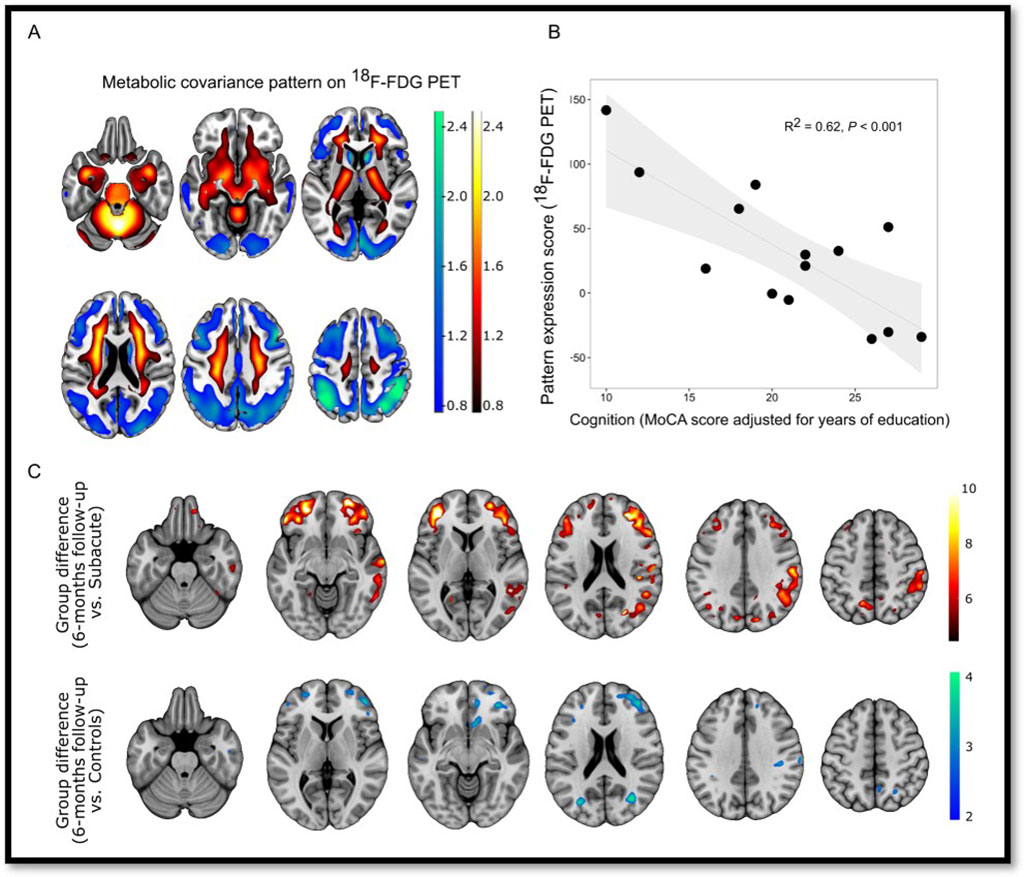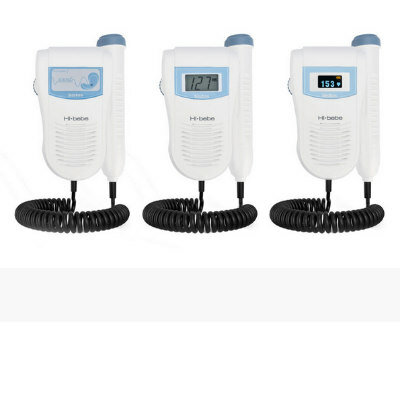PET Imaging Can Accurately Measure Cognitive Impairment in COVID-19 Patients
|
By MedImaging International staff writers Posted on 18 Jun 2021 |

Image: PET Imaging Can Accurately Measure Cognitive Impairment in COVID-19 Patients(Photo courtesy of G Blazhenets et al., Department of Nuclear Medicine, Medical Center – University of Freiburg, Faculty of Medicine, University of Freiburg)
The effects of COVID-19 on the brain can be accurately measured with positron emission tomography (PET), according to research presented at the Society of Nuclear Medicine and Molecular Imaging (SNMMI) 2021 Annual Meeting.
In the study conducted by researchers at the University Medical Center Freiburg (Freiburg, Germany), newly diagnosed COVID-19 patients, who required inpatient treatment and underwent PET brain scans, were found to have deficits in neuronal function and accompanying cognitive impairment, and in some, this impairment continued six months after their diagnosis. The detailed depiction of areas of cognitive impairment, neurological symptoms and comparison of impairment over a six-month time frame has been selected as SNMMI’s 2021 Image of the Year.
To study cognitive impairment associated with COVID-19, the researchers carried out a prospective study on recently diagnosed COVID-19 patients who required inpatient treatment for non-neurological complaints. A cognitive assessment was performed, followed by imaging with 18F-FDG PET if at least two new neurological symptoms were present. By comparing COVID-19 patients to controls, the researchers established a COVID-19-related covariance pattern of brain metabolism with most prominent decreases in cortical regions. Across patients, the expression of this pattern showed a very high correlation with the patients’ cognitive performance. Follow-up PET imaging was performed six months after the initial COVID-19 diagnosis. Imaging results showed a significant improvement in the neurocognitive deficits in most patients, accompanied by an almost complete normalization of the brain metabolism.
“We can clearly state that a significant recovery of regional neuronal function and cognition occurs for most COVID-19 patients based on the results of this study. However, it is important to recognize the evidence of longer-lasting deficits in neuronal function and accompanying cognitive deficits is still measurable in some patients six months after manifestation of disease,” said Ganna Blazhenets, PhD, a post-doctoral researcher in Medical Imaging at the University Medical Center Freiburg. “As a result, post-COVID-19 patients with persistent cognitive complaints should be presented to a neurologist and possibly allocated to cognitive rehabilitation programs.”
Related Links:
University Medical Center Freiburg
In the study conducted by researchers at the University Medical Center Freiburg (Freiburg, Germany), newly diagnosed COVID-19 patients, who required inpatient treatment and underwent PET brain scans, were found to have deficits in neuronal function and accompanying cognitive impairment, and in some, this impairment continued six months after their diagnosis. The detailed depiction of areas of cognitive impairment, neurological symptoms and comparison of impairment over a six-month time frame has been selected as SNMMI’s 2021 Image of the Year.
To study cognitive impairment associated with COVID-19, the researchers carried out a prospective study on recently diagnosed COVID-19 patients who required inpatient treatment for non-neurological complaints. A cognitive assessment was performed, followed by imaging with 18F-FDG PET if at least two new neurological symptoms were present. By comparing COVID-19 patients to controls, the researchers established a COVID-19-related covariance pattern of brain metabolism with most prominent decreases in cortical regions. Across patients, the expression of this pattern showed a very high correlation with the patients’ cognitive performance. Follow-up PET imaging was performed six months after the initial COVID-19 diagnosis. Imaging results showed a significant improvement in the neurocognitive deficits in most patients, accompanied by an almost complete normalization of the brain metabolism.
“We can clearly state that a significant recovery of regional neuronal function and cognition occurs for most COVID-19 patients based on the results of this study. However, it is important to recognize the evidence of longer-lasting deficits in neuronal function and accompanying cognitive deficits is still measurable in some patients six months after manifestation of disease,” said Ganna Blazhenets, PhD, a post-doctoral researcher in Medical Imaging at the University Medical Center Freiburg. “As a result, post-COVID-19 patients with persistent cognitive complaints should be presented to a neurologist and possibly allocated to cognitive rehabilitation programs.”
Related Links:
University Medical Center Freiburg
Latest General/Advanced Imaging News
- Bone Density Test Uses Existing CT Images to Predict Fractures
- AI Predicts Cardiac Risk and Mortality from Routine Chest CT Scans
- Radiation Therapy Computed Tomography Solution Boosts Imaging Accuracy
- PET Scans Reveal Hidden Inflammation in Multiple Sclerosis Patients
- Artificial Intelligence Evaluates Cardiovascular Risk from CT Scans
- New AI Method Captures Uncertainty in Medical Images
- CT Coronary Angiography Reduces Need for Invasive Tests to Diagnose Coronary Artery Disease
- Novel Blood Test Could Reduce Need for PET Imaging of Patients with Alzheimer’s
- CT-Based Deep Learning Algorithm Accurately Differentiates Benign From Malignant Vertebral Fractures
- Minimally Invasive Procedure Could Help Patients Avoid Thyroid Surgery
- Self-Driving Mobile C-Arm Reduces Imaging Time during Surgery
- AR Application Turns Medical Scans Into Holograms for Assistance in Surgical Planning
- Imaging Technology Provides Ground-Breaking New Approach for Diagnosing and Treating Bowel Cancer
- CT Coronary Calcium Scoring Predicts Heart Attacks and Strokes
- AI Model Detects 90% of Lymphatic Cancer Cases from PET and CT Images
- Breakthrough Technology Revolutionizes Breast Imaging
Channels
Radiography
view channel
Novel Breast Imaging System Proves As Effective As Mammography
Breast cancer remains the most frequently diagnosed cancer among women. It is projected that one in eight women will be diagnosed with breast cancer during her lifetime, and one in 42 women who turn 50... Read more
AI Assistance Improves Breast-Cancer Screening by Reducing False Positives
Radiologists typically detect one case of cancer for every 200 mammograms reviewed. However, these evaluations often result in false positives, leading to unnecessary patient recalls for additional testing,... Read moreMRI
view channel
Low-Cost Whole-Body MRI Device Combined with AI Generates High-Quality Results
Magnetic Resonance Imaging (MRI) has significantly transformed healthcare, providing a noninvasive, radiation-free method for detailed imaging. It is especially promising for the future of medical diagnosis... Read more
World's First Whole-Body Ultra-High Field MRI Officially Comes To Market
The world's first whole-body ultra-high field (UHF) MRI has officially come to market, marking a remarkable advancement in diagnostic radiology. United Imaging (Shanghai, China) has secured clearance from the U.... Read moreUltrasound
view channel.jpg)
Diagnostic System Automatically Analyzes TTE Images to Identify Congenital Heart Disease
Congenital heart disease (CHD) is one of the most prevalent congenital anomalies worldwide, presenting substantial health and financial challenges for affected patients. Early detection and treatment of... Read more
Super-Resolution Imaging Technique Could Improve Evaluation of Cardiac Conditions
The heart depends on efficient blood circulation to pump blood throughout the body, delivering oxygen to tissues and removing carbon dioxide and waste. Yet, when heart vessels are damaged, it can disrupt... Read more
First AI-Powered POC Ultrasound Diagnostic Solution Helps Prioritize Cases Based On Severity
Ultrasound scans are essential for identifying and diagnosing various medical conditions, but often, patients must wait weeks or months for results due to a shortage of qualified medical professionals... Read moreNuclear Medicine
view channelNew PET Agent Rapidly and Accurately Visualizes Lesions in Clear Cell Renal Cell Carcinoma Patients
Clear cell renal cell cancer (ccRCC) represents 70-80% of renal cell carcinoma cases. While localized disease can be effectively treated with surgery and ablative therapies, one-third of patients either... Read more
New Imaging Technique Monitors Inflammation Disorders without Radiation Exposure
Imaging inflammation using traditional radiological techniques presents significant challenges, including radiation exposure, poor image quality, high costs, and invasive procedures. Now, new contrast... Read more
New SPECT/CT Technique Could Change Imaging Practices and Increase Patient Access
The development of lead-212 (212Pb)-PSMA–based targeted alpha therapy (TAT) is garnering significant interest in treating patients with metastatic castration-resistant prostate cancer. The imaging of 212Pb,... Read moreGeneral/Advanced Imaging
view channelBone Density Test Uses Existing CT Images to Predict Fractures
Osteoporotic fractures are not only devastating and deadly, especially hip fractures, but also impose significant costs. They rank among the top chronic diseases in terms of disability-adjusted life years... Read more
AI Predicts Cardiac Risk and Mortality from Routine Chest CT Scans
Heart disease remains the leading cause of death and is largely preventable, yet many individuals are unaware of their risk until it becomes severe. Early detection through screening can reveal heart issues,... Read moreImaging IT
view channel
New Google Cloud Medical Imaging Suite Makes Imaging Healthcare Data More Accessible
Medical imaging is a critical tool used to diagnose patients, and there are billions of medical images scanned globally each year. Imaging data accounts for about 90% of all healthcare data1 and, until... Read more
Global AI in Medical Diagnostics Market to Be Driven by Demand for Image Recognition in Radiology
The global artificial intelligence (AI) in medical diagnostics market is expanding with early disease detection being one of its key applications and image recognition becoming a compelling consumer proposition... Read moreIndustry News
view channel
Hologic Acquires UK-Based Breast Surgical Guidance Company Endomagnetics Ltd.
Hologic, Inc. (Marlborough, MA, USA) has entered into a definitive agreement to acquire Endomagnetics Ltd. (Cambridge, UK), a privately held developer of breast cancer surgery technologies, for approximately... Read more
Bayer and Google Partner on New AI Product for Radiologists
Medical imaging data comprises around 90% of all healthcare data, and it is a highly complex and rich clinical data modality and serves as a vital tool for diagnosing patients. Each year, billions of medical... Read more





















